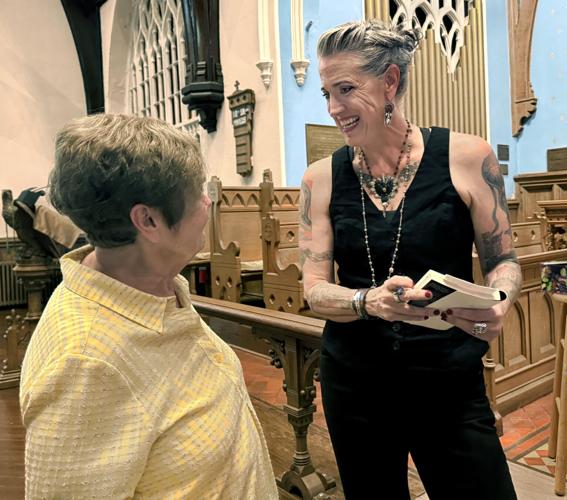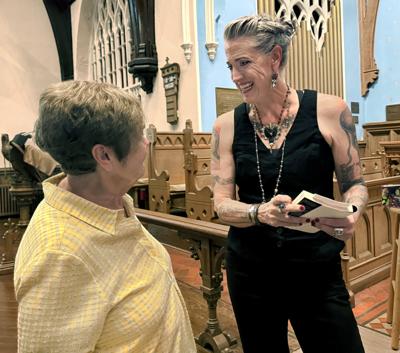Nadia Bolz-Weber stood before an audience at St. John's Episcopal Church in ĀŅĀ×ÄŚÉä and breathed. She held out her arms, closed her eyes, took a deep breath and exhaled slowly.
āBreathe with me,ā she said. The entire congregation did.
After the breathing exercises, she pulled out a pitch pipe ā the kind used by old-time song leaders to help them find the proper key ā and led the group in a session of a cappella singing. She explained she was raised attending Churches of Christ, a group known for its congregational singing and vocal harmonies.
Though she still loves the old hymns and spirituals, Nadia Bolz-Weber long ago left evangelical fundamentalism behind. Clad in black, her sleeveless shirt revealing inked arms, and her silver hair pulled back, she exudes a raw, unvarnished defiance. The organizers billed the Aug. 23 event as part of her Red State Revival Tour.
More than 400 people filled St. John's sanctuary where, in addition to singing, she spoke, greeted people and signed books. The night before, 700 people had gathered to see her in Columbus, Ohio.
Bolz-Weber became an ordained Lutheran minister in 2008 and was the founding pastor of House for All Sinners and Saints in Denver, where her ministry reached out to society's marginalized groups. She served there until 2018. Now an author and public speaker, Bolz-Weber is known for her LGBTQ+ inclusive, feminist theology.
The word ārevivalā for her tour was chosen with care. Her message sought to uplift rather than inflame, to build solidarity rather than sow division.
āI'm giving my testimony tonight,ā she said.
The only explicitly political note of the evening came in her reference to the rise of āwhite Christian nationalismā and its impact on both church and country. Nadia Bolz-Weber connected this to her own faith journey and, in doing so, spoke about power, helplessness, and hope.
āThe problem with Christian nationalism ā other than the fact that it's idolatry ā the real problem is this: You can draw God's name into your delusional obsession with power, but you cannot draw God into your delusional obsession with power,ā Bolz-Weber said. āGod will not be mocked by his name being used as camouflage for pathetic human ambitions and will to power. None of that lasts. But you know what has lasted? The actual gospel.ā
She frames her point through a thought experiment in time travel.
āSometimes I wonder what it felt like to be ruled by men like Tiberius, Pontius Pilate and Herod, and to be occupied by their military forces. I wonder if the people of Judea felt despair under the executive orders of those whose power at the time must have seemed insurmountable.
āIf so, I wish I could go back 2,000 years, because I would tell them this: The only reason anyone knows those guy's names today, the only reason anyone ever says their name, the only reason these tiny, so-called powerful men are even remembered at all, is as a footnote to Jesus of Nazareth.ā
As she explains it, everything comes down to one simple idea: āDominant powers are not ultimate powers.ā
She spoke about the massive stones of the Jewish temple and how, despite their strength, they could not prevent the templeās destruction. It was more than a history lesson. Bolz-Weber emphasized that everyone builds their own temples, and eventually, all of them will fall. Power is temporary, she said, but powerlessness can be terrifying. Bad things will happen, and they will be beyond our control.
āWars will not end. There will be destruction and famine. There will be pandemics and fake news, and the āLeft Behindā series of books (this gets a laugh from the audience). There will be beloved churches that close, family trouble, illness, natural disasters. All of this will happen, all of it is real and none of it is a sign of God's absence.
āThese things bring suffering, but they need not bring hopelessness. All of us at some point in our lives will have the stones of our own temple crumble underneath us. There will be times in our life when everything goes from hashtag 'blessed' to hashtag 'screwed'.ā
Her final words shifted to her central messageāone not of despair, but hope.
āNone of that means hope is gone. Fake hope in the form of vapid optimism might go. But not real hope. And real hope is the kind I myself could use right now. The kind of hope that reminds us that God's faithfulness far outreaches our temporary temples.
āTogether, good people, we are going to hold fast. Hard things, horrible things, unthinkable things will happen. But as Paul reminded the church in Rome, in all of these things we are more than conquerors. And as the Persian poet Rumi said, ours is no caravan of despair.ā
Her ĀŅĀ×ÄŚÉä appearance was the final stop of the tour, which carried no sponsorships and operated on a pay-what-you-can ticket model. A portion of the proceeds went to St. Johnās, which donated the funds to the ĀŅĀ×ÄŚÉä YWCA.













